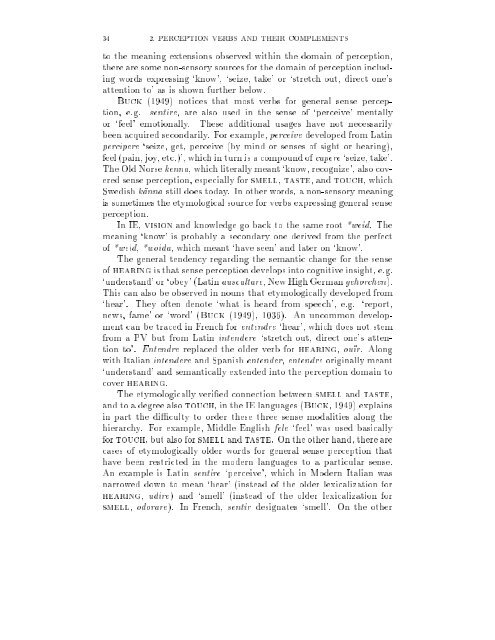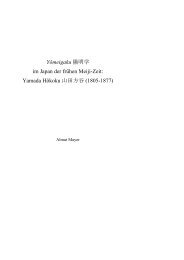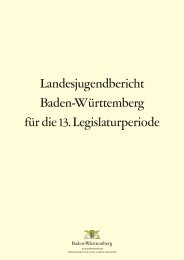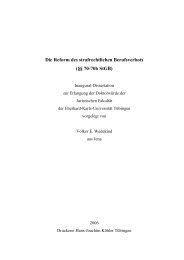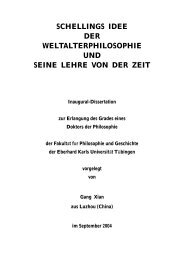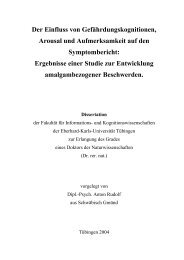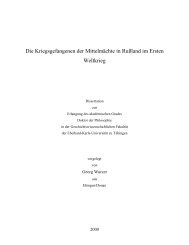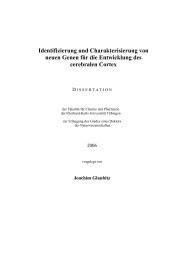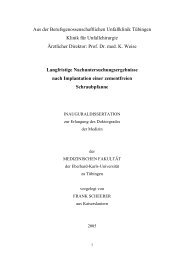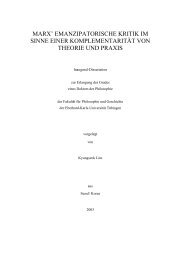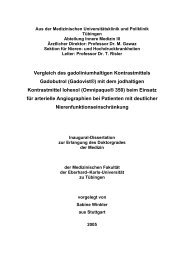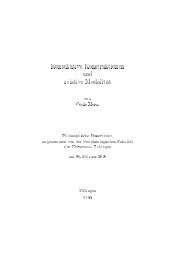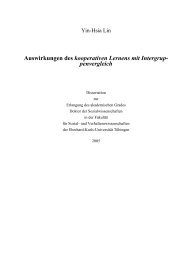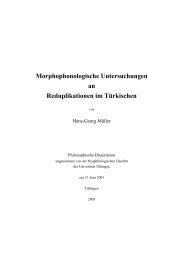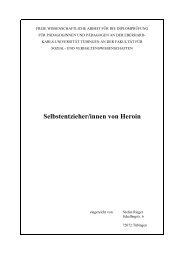Perception verb complements in Akatek, a Mayan language
Perception verb complements in Akatek, a Mayan language
Perception verb complements in Akatek, a Mayan language
Create successful ePaper yourself
Turn your PDF publications into a flip-book with our unique Google optimized e-Paper software.
34 2. PERCEPTION VERBS AND THEIR COMPLEMENTS<br />
to the mean<strong>in</strong>g extensions observed with<strong>in</strong> the doma<strong>in</strong> of perception,<br />
there are some non-sensory sources for the doma<strong>in</strong> of perception <strong>in</strong>clud<strong>in</strong>g<br />
words express<strong>in</strong>g `know', `seize, take' or `stretch out, direct one's<br />
attention to' as is shown further below.<br />
Buck (1949) notices that most <strong>verb</strong>s for general sense perception,<br />
e.g. sentire, are also used <strong>in</strong> the sense of `perceive' mentally<br />
or `feel' emotionally. These additional usages have not necessarily<br />
been acquired secondarily. For example, perceive developed from Lat<strong>in</strong><br />
percipere `seize, get, perceive (by m<strong>in</strong>d or senses of sight or hear<strong>in</strong>g),<br />
feel (pa<strong>in</strong>, joy, etc.)', which <strong>in</strong> turn is a compound of capere `seize, take'.<br />
The Old Norse kenna, which literally meant `know, recognize', also covered<br />
sense perception, especially for smell, taste, and touch, which<br />
Swedish kanna still does today. In other words, a non-sensory mean<strong>in</strong>g<br />
is sometimes the etymological source for <strong>verb</strong>s express<strong>in</strong>g general sense<br />
perception.<br />
In IE, vision and knowledge go back to the same root *weid. The<br />
mean<strong>in</strong>g `know' is probably a secondary one derived from the perfect<br />
of *weid, *woida, which meant `have seen' and later on `know'.<br />
The general tendency regard<strong>in</strong>g the semantic change for the sense<br />
of hear<strong>in</strong>g is that sense perception develops <strong>in</strong>to cognitive <strong>in</strong>sight, e.g.<br />
`understand' or `obey' (Lat<strong>in</strong> auscultare, New High German gehorchen).<br />
This can also be observed <strong>in</strong> nouns that etymologically developed from<br />
`hear'. They often denote `what is heard from speech', e.g. `report,<br />
news, fame' or `word' (Buck (1949), 1036). An uncommon development<br />
can be traced <strong>in</strong> French for entendre `hear', which does not stem<br />
from a PV but from Lat<strong>in</strong> <strong>in</strong>tendere `stretch out, direct one's attention<br />
to'. Entendre replaced the older <strong>verb</strong> for hear<strong>in</strong>g, ou r. Along<br />
with Italian <strong>in</strong>tendere and Spanish entender, entendre orig<strong>in</strong>ally meant<br />
`understand' and semantically extended <strong>in</strong>to the perception doma<strong>in</strong> to<br />
cover hear<strong>in</strong>g.<br />
The etymologically veri ed connection between smell and taste,<br />
and to a degree also touch, <strong>in</strong> the IE <strong>language</strong>s (Buck, 1949) expla<strong>in</strong>s<br />
<strong>in</strong> part the di culty to order these three sense modalities along the<br />
hierarchy. For example, Middle English fele `feel' was used basically<br />
for touch, but also for smell and taste. On the other hand, there are<br />
cases of etymologically older words for general sense perception that<br />
have been restricted <strong>in</strong> the modern <strong>language</strong>s to a particular sense.<br />
An example is Lat<strong>in</strong> sentire `perceive', which <strong>in</strong> Modern Italian was<br />
narrowed down to mean `hear' (<strong>in</strong>stead of the older lexicalization for<br />
hear<strong>in</strong>g, udire) and `smell' (<strong>in</strong>stead of the older lexicalization for<br />
smell, odorare). In French, sentir designates `smell'. On the other


